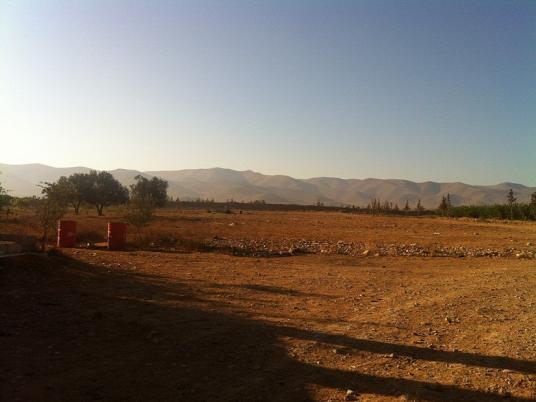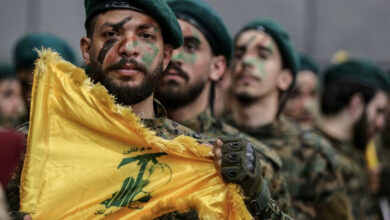
EAST LEBANON — Abu Fakher Zaarour, a farmer in his 60s, has lived all his life in Masharee al-Qaa, a strip of farms in between Syria and Lebanon.
He’s not allowed to drive strangers in the area at the moment, because for the past four months, the Lebanese farms on the border have been shelled by the Syrian army every night, but he does so anyway. Lebanese military intelligence has an office on the main road, so he takes a back road.
Sitting at the wheel of his battered, old truck, he and his wife are not going to leave, he said — no matter what.
“They’re looking for Syrian rebels. They come in and out of Lebanon. They never stay here, nor do they have a base here. But there is shooting every night,” he said while approaching the Lebanon-Syria border crossing. “Look, the soldiers are here now, don’t say a word.”
But the two Lebanese soldiers greeted the old man and let him pass without asking any questions.
“From now on, we are on our own,” the farmer said.
Masharee al-Qaa, in the eastern Bekaa Valley, is where the trouble starts on the Lebanon-Syria border. The strip of farms on the outskirts of the village stretches for about 60 kilometers along the border to the farms of Aarsal village, located in a valley of the Anti-Lebanon Mountains.
With the northern border area of Wadi Khaled mined by the Syrian army at the end of 2011, the nearby strip of farms in between the two countries has become the only alternative for the Syrian rebels fighting against President Bashar al-Assad’s regime to regroup and conduct their operations against the loyalist army. But the farmland also serves thousands of refugees who flee besieged towns and villages close to the Lebanese borders.
The farms between Masharee al-Qaa and Aarsal have become a battlefield. From time to time, the Lebanese army confiscates truckloads of weapons destined for the rebels in Syria, the Syrian army shells houses, raids them or simply positions snipers who shoot at anything that moves during the night.
Several farmers and shepherds have been shot dead, and scores have been wounded. The most recent victim was shot dead by a sniper Tuesday. The farmer was sitting on his veranda with the lights on.
However, Zaarour said most people got used to the fighting. On Wednesday, he sat on his veranda with the lights on, next to his wife, his daughter and his newborn grandson and sipped his evening tea.
“My son is angry because he wants us to leave this place. He moved to Aarsal, to the village, where planes don’t bomb. But I don’t want to. This is our home,” he explained, as the gunshots intensified on the border, about three kilometers away.
At about 10:30 pm, the shells started falling. The Zaarours and his neighbors gathered in the garden to watch.
“It’s ok, we’re far from the fighting area,” Zeina, the farmer’s daughter, said. “My house is right on the border line. I had to leave all my neighbors, because they were shooting at us. My neighbor’s house was flattened completely and the dairy factory now has Syrian soldiers on the roof,” she said, while rocking her baby’s cradle and gazing at the bombing in awe.
The Lebanese army has only two outposts in the area: one in Masharee al-Qaa and the other in a farmhouse in Kherbet Daoud area of Aarsal. The military bases are located in the villages.
The Lebanese soldiers stay out of trouble, as they say they have orders not to interfere in the Syrian conflict. They are armed with only M16 rifles. But last week, they were dragged into the battle several times.
After the Lebanese army stopped a pickup truck filled with Syrian rebels and freed Syrian army soldiers held prisoner in the Ras Baalbek border town on 14 September, the Lebanese soldiers from the two outposts in the farmland said they were attacked by the rebels twice on 24 September.
One attack took place in Wadi al-Shahout and another in the Kherbet Daoud farms of the Aarsal area. The Syrian air force bombed the farm strip several times and even dropped a bomb on the Lebanese army base in the village of Aarsal.
On 26 September, the Syrian fighter jets returned and the bombing intensified in the farmland of Aarsal and Masharee al-Qaa. The Lebanese soldiers did not retaliate. They said it was an accident and the Syrian jets were looking for the rebels.
The Kherbet Daoud farmlands in Aarsal are also off limits for journalists and foreigners. The police checkpoint located a half an hour drive from the village’s center is only guarded by one policeman wearing a special forces uniform complemented by an M16 rifle. The rest of the policemen sit around in their shorts watching a Turkish soap opera.
“You can’t go to the farms; the Syrians have been bombing the area because there are Free Syrian Army fighters hiding there,” the policeman said.
However, a Lebanese farmer passes through the checkpoint with his truck full of water butts.
“Only locals are allowed to go there. Check with the army in Beirut for a special permit. But I doubt they’ll give it to you,” he says.
In the municipality office of Aarsal, Deputy Mayor Ahmed Fleeti makes the official statements. The mayor, Ali Hojairy, has been suspended after the local council demanded his resignation because he got too involved in political bickering over hosting Syrian refugees and possibly Free Syrian Army fighters. He refused to speak about the incidents in Kherbet Doud farm area, although the villagers say that he owns land there.
“We have no fighters here, it’s impossible for them to move in this area. Kherbet Daoud is a valley, the Syrians can see everything that moves from their outpost,” Fleeti explained.
He also said there were no clashes between the Lebanese army and the rebels.
“They are all civilians. They shoot at civilians all the time,” he said angrily. “A couple of weeks ago, two Syrian refugees were shot at. One died, the other made it to the village. We looked for the body for a week to give him a proper burial.”
He explained that he receives seven refugee families every day, and they all cross through the farms at night.
He said that when a truck with Syrian refugees reached the army outpost on 23 September, the refugees saw the lights on, thought it was a house and they knocked to ask for shelter.
“They were just surprised when a soldier opened the door, that’s all,” he insisted. “We only host refugees here. Look, I have the list of 300 houses where we sheltered Syrians fleeing the conflict. The Syrian army is bombing us all the time and nobody is defending us. The army is always late.”
But a Syrian activist in Tripoli, North Lebanon, who gathers fighters from the poor neighborhoods where refugees are hosted, confirms that most of the young men who came to Lebanon as refugees but want to fight against Assad’s regime leave for the Bekaa Valley to join the rebels.
“My brother is there right now,” he said, speaking on anonymity and adding that the clashes were probably accidental. “None of the revolutionaries want to fight the Lebanese army. They are there for the revolution. We just wish the Lebanese army would help them.”
The soldiers in Aarsal said there are hundreds of Syrian fighters in the farms, and that is why the Syrian army is bombing the area.
“We don’t really want to get involved in all this, and we have orders to stay out of it. They already bombed very close to our base,” a soldier said, shrugging.
In Masharee al-Qaa, the bombing and the shooting stopped at dawn Wednesday. A few motorcycles passed by Zaarour’s house with their lights off.
“They are probably rebels,” the farmer said while lighting a cigarette. “There are many Syrians around the farms here, and you never know who exactly you’re hosting.”




